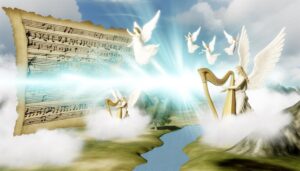Biblical Meaning of Name Zion
The name 'Zion' in the Bible originates from ancient Hebrew texts, initially designating a specific hill in Jerusalem. Over time, it expanded to symbolize Jerusalem's entire spiritual and political landscape.
In the Old Covenant, Zion represents the divine presence and the city's central role in Israelite identity (Isaiah 2:3). This symbolism evolves in the New Covenant to denote the heavenly Jerusalem and ultimate redemption through Christ (Hebrews 12:22).
Today, Zion remains a potent metaphor for spiritual refuge and divine promise, influencing theological paradigms and cultural narratives. To gain further insights into its multifaceted meaning, continue exploring.

Key Takeaways
- Zion initially referred to a specific hill in Jerusalem, later symbolizing the entire city and its spiritual significance.
- In the Old Testament, Zion is depicted as a divine city, symbolizing God's presence, protection, and covenant.
- Zion represents hope, divine promise, and is central to Israelite identity and biblical theology.
- In the New Testament, Zion signifies the heavenly Jerusalem and the realization of God's salvific plan through Jesus Christ.
- Today, Zion remains a symbol of spiritual refuge, divine promise, and eschatological hope within various faith traditions.
Origin of Zion
The origin of the name 'Zion' is deeply rooted in ancient Hebrew texts, where it initially referred to a specific hill in Jerusalem, later symbolizing the entire city and its spiritual significance.
The term 'Zion' first appears in the Hebrew Bible as a Jebusite fortress captured by King David (2 Samuel 5:7). Over time, its meaning expanded, encompassing the City of David and eventually the whole of Jerusalem (Psalms 48:2).
Scholarly interpretations suggest that Zion's evolution reflects its centrality in Jewish religious and national identity. Scholars such as John Bright argue that Zion's transformation symbolizes a shift from a physical location to a metaphysical idea, illustrating Jerusalem's profound spiritual and cultural resonance (Bright, J., 'A History of Israel').
Zion in the Old Testament
In the Old Covenant, Zion is frequently depicted as both a divine city and a central political and spiritual hub, as evidenced in Psalms 48:2 and Isaiah 2:3.
It serves as a symbol of hope and divine promise, encapsulating the aspirations of the Israelite people for a sanctified and protected homeland (2 Samuel 5:7, Jeremiah 31:6).
These representations underscore Zion’s multifaceted significance in biblical theology and Israelite identity. Zion is not only a physical location but also a symbol of God’s presence and the promised land for the Israelites. Its mention in the Psalms and the prophets reaffirms its importance in the biblical significance of Israel. The concept of Zion also carries the idea of spiritual renewal and restoration, making it a central theme in the identity of the Israelites as God’s chosen people.
Zion as God's City
Throughout the Old Scriptures, Zion is frequently depicted as the divine city of God, symbolizing His presence, protection, and covenant with His people (Isaiah 8:18; Psalm 132:13-14). Zion, often synonymous with Jerusalem, is portrayed as the epicenter of God's earthly dwelling place, where His divine presence sanctifies the city (Psalms 48:1-2).
The Old Writing underscores Zion's role in God's redemptive history, reflecting a theological dimension where the city becomes a microcosm of divine-human interaction. Scholarly interpretations emphasize that Zion represents not merely a physical locale but also a spiritual bastion, reinforcing the perpetual covenant between God and Israel (2 Samuel 5:7). This sanctified city hence embodies divine favor and eternal promise.
Political and Spiritual Hub
As both a political and spiritual hub, Zion in the Old Covenant represents a central axis of religious authority and national identity for the people of Israel (2 Samuel 5:7; 1 Kings 8:1).
In the political domain, Zion, often synonymous with Jerusalem, was established as the capital by King David, solidifying its status as the seat of power.
Spiritually, Zion housed the Ark of the Covenant and later Solomon's Temple, becoming the focal point of Jewish worship and sacrificial rites (1 Kings 8:4-11).
This duality reinforced Zion's significance, intertwining governance with divine worship, shaping Israel's socio-religious landscape.
Consequently, Zion epitomized the convergence of political sovereignty and spiritual sanctity, forming the bedrock of Israelite identity and cohesion.
Symbol of Hope
Zion, frequently referenced in the Psalms and prophetic literature, embodies a profound symbol of hope and divine promise for the Israelites, signifying future restoration and divine intervention (Isaiah 2:2-3; Psalm 126:1). The biblical meaning of Zion goes beyond just a physical location and holds spiritual significance for believers. It represents God’s faithfulness and steadfast love, as well as a future hope for redemption and renewal. The concept of Zion has inspired countless hymns, prayers, and meditations throughout the ages, reminding believers of God’s unfailing promises and ultimate victory.
This theological motif underscores Zion as a locus where God's presence will manifest, offering solace amid tribulation. Isaiah's vision of nations streaming to Zion (Isaiah 2:2-3) and the psalmist's depiction of joy upon Zion's restoration (Psalm 126:1) emphasize an eschatological hope.
Scholarly interpretations suggest that Zion transcends its geographical connotations, serving as an enduring metaphor for the ultimate reconciliation between God and His people. Therefore, Zion functions not merely as a physical locale but as a prophetic beacon of divine fidelity and future redemption.
Zion and Jerusalem
The historical and theological connections between Zion and Jerusalem are deeply rooted in ancient Jewish traditions and biblical texts. Zion is frequently synonymous with Jerusalem, particularly the City of David, signifying the political and spiritual epicenter of the Israelites (2 Samuel 5:7).
This duality is evident in Psalms 48:2, which exalts Zion as 'the city of the great King.' Jerusalem symbolizes the divine presence and covenantal relationship between God and His people, as described in Isaiah 2:3, where 'the law shall go forth from Zion.'
Zion encapsulates both a geographical locality and a theological construct, embodying the unity of the sacred and the civic in Jewish consciousness (Smith, 1997).
Symbolism of Zion
Zion's symbolism extends beyond its geographical identity, encompassing profound spiritual and eschatological dimensions within biblical literature (Barker, 2005).
Symbolically, Zion often represents the divine dwelling place of God, serving as a metaphor for spiritual refuge and divine governance (Isaiah 2:3). It is depicted as the ultimate destination for the faithful, embodying notions of redemption and eternal peace (Psalms 132:13-14).
Additionally, Zion is frequently associated with the fulfillment of God's promises and the establishment of His kingdom on Earth (Micah 4:7). This multifaceted symbolism has influenced theological interpretations and has reinforced Zion's significance as both a literal and figurative cornerstone of faith and prophecy within the Judeo-Christian tradition (Smith, 2013).
Zion in the New Testament
In the New Scripture, Zion is frequently invoked to signify the realization of God's salvific plan through Jesus Christ, as seen in Hebrews 12:22 and Revelation 14:1 (Wright, 2012).
The New Scripture reinterprets Zion not only as a geographical location but as a spiritual symbol of the heavenly Jerusalem. Hebrews 12:22 describes believers as having come to 'Mount Zion, the city of the living God, the heavenly Jerusalem,' emphasizing a spiritual transformation (Hogan, 2013).
Revelation 14:1 further envisions the Lamb standing on Mount Zion with 144,000 followers, symbolizing ultimate redemption and divine presence (Johnson, 2019).
Consequently, Zion is recontextualized to reflect eschatological fulfillment in Christian theology.
Zion's Relevance Today
Modern theological discourse often explores Zion's enduring significance as both a spiritual metaphor and a cultural symbol, reflecting its multifaceted impact on contemporary religious identity (Smith, 2020). Zion remains a symbol of hope and divine promise within various faith traditions, and it serves as a focal point for eschatological expectations and communal aspirations.
| Aspect | Contemporary Relevance |
|---|---|
| Spiritual Metaphor | Represents the ultimate spiritual homeland |
| Cultural Symbol | Embodies cultural and national identity |
| Eschatological Expectation | Central in discussions about the end times |
| Communal Aspirations | Inspires collective movements and social justice |
This dual role of Zion continues to shape theological paradigms and cultural narratives, underscoring its persistent influence in modern religious thought and practice.
Conclusion
In summation, the term Zion embodies a rich tapestry of historical, theological, and symbolic connotations within biblical literature.
Originating from ancient texts, Zion initially denoted a specific geographical location but evolved to signify the spiritual heart of Jerusalem.
In both Old and New Scriptures, Zion serves as a metaphorical representation of divine presence and ultimate redemption.
Contemporary interpretations continue to draw from this profound legacy, underscoring Zion's enduring relevance in theological discourse and spiritual praxis.






